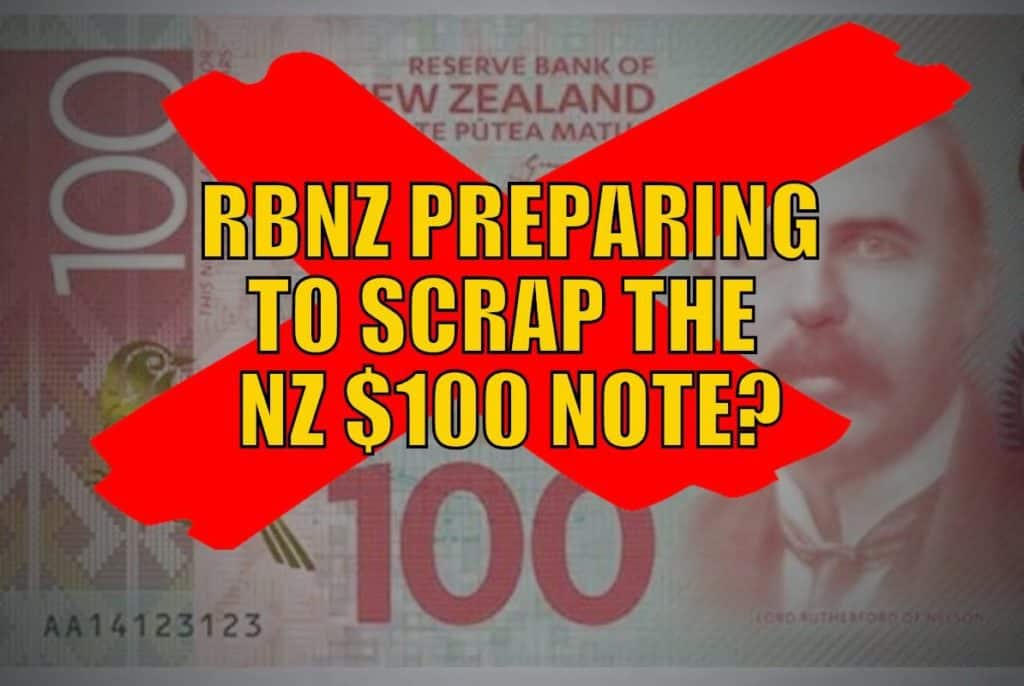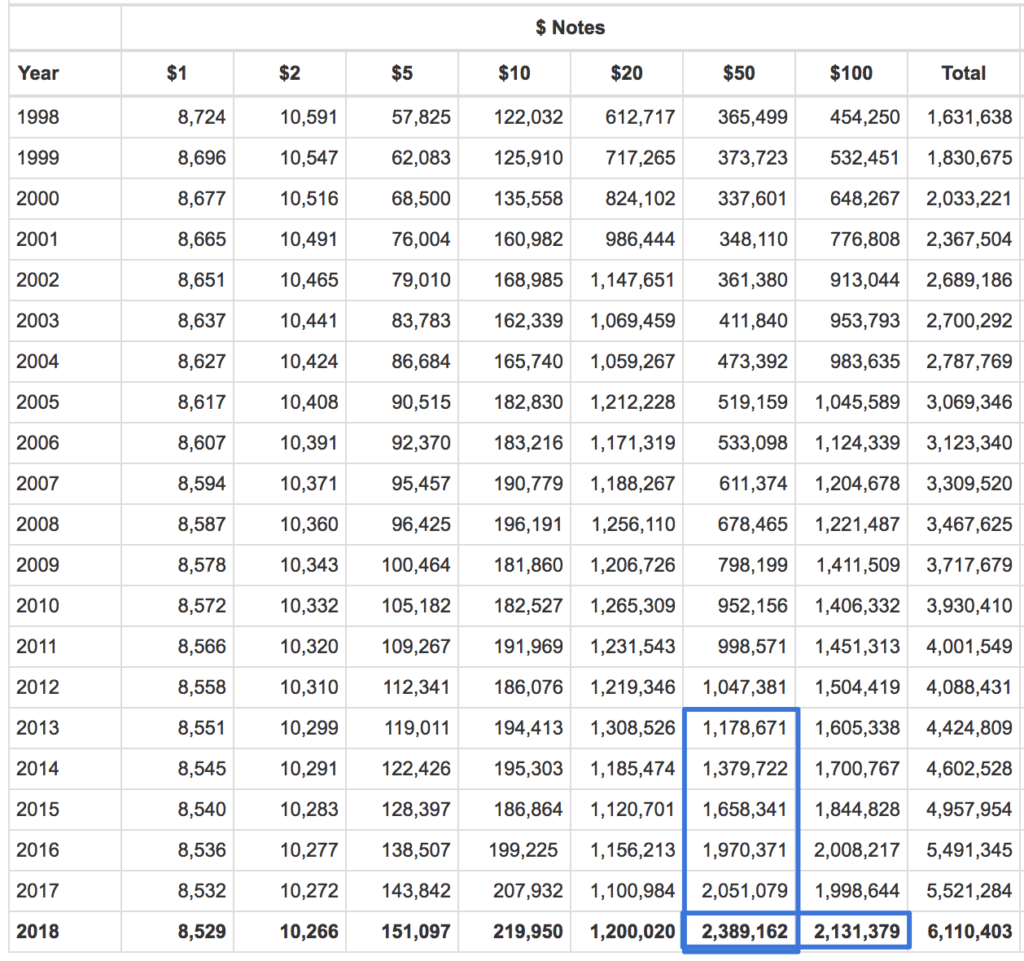Over the years we’ve reported on the war on cash and how various countries have been removing high denomination notes. Here’s some evidence that the Reserve Bank may be preparing to scrap the New Zealand $100 note. This would be the biggest step in the war on cash in New Zealand to date.
Last week we were alerted to a strange anomaly in the value of bank notes in the hands of the New Zealand public. Taylor Kee at Money Morning reported that there has been a dramatic rise in the number of $50 notes over the past 5 years.
Here’s the figures from the Reserve Bank of New Zealand website:
Bank notes in the hands of the public – F3
As at last Wednesday in March (NZ$ thousands)
Source: RBNZ
A number of points stand out to us in this table:
- First the total value of cash in circulation has been increasing at a fairly constant rate.
- The number of $1, $2, $5, $10, and $20 notes have not changed greatly in the last 5 years.
- However the value of $50 notes has more than doubled over this time (see column in blue).
- The value of $100 notes has also increased although only by about one third.
- Significantly for the past 2 years the total value of $50 notes has actually been higher than the $100 notes. This has never happened before. Previously the value of the $100 notes in circulation was significantly higher than the $50’s.
Why Has the Value of $50 Notes Surpassed the Value of $100’s?
We’ve reported extensively that there has been a war on cash globally over the past few years. Some countries have done away with high denomination notes. Others have moved to become almost cashless societies.
But here in New Zealand the value of cash has continued growing.
At the time of the financial crisis in late 2008 the RBNZ reported that the issuance of $50 and $100 notes increased. They also noted that when this increased issuance slowed, these hoarded notes did not immediately return into circulation. See: Hoarding of NZ$50 and NZ$100 notes seen in Sept/Oct crisis, says RBNZ
This same report noted:
“an underlying growth trend for the last few years in issuance of the NZ$50 note due to the shift away from NZ$20 notes towards NZ$50 notes in ATMs”.
So is the value of $50 notes now greater than the $100 notes simply because the $50’s are now used in ATM’s?
Perhaps.
However this report was from 2009. The move towards using $50 notes in ATM’s was already well underway back then. So we doubt the $50 issuance has increased to the degree it has solely due to more $50 notes in ATM’s.
Our guess is another reason.
Perhaps the RBNZ is preparing for the removal of the $100 note in New Zealand?
If a central bank was going to remove the $100 note from circulation, it would make sense to have plenty of $50’s to replace them wouldn’t it?
So perhaps the RBNZ has been building the reserves of $50 notes in preparation of abolishing the New Zealand $100 note?
Would the RBNZ Really Remove the $100 Note?
Do you think that it seems a bit far fetched that the Reserve Bank might remove the $100 note from circulation?
Well, there have been a number of banks and other institutions calling for the removal of $100 notes.
In 2016, a compliance company that specialises in getting businesses compliant with anti-money laundering (AML) legislation makes the argument that:
“Cash is still the most efficient way to launder money. It is less traceable than Bitcoin, much more widely accepted than precious stones, and less volatile than property.
…Countries will need to work together to reduce the money laundering threat of cash. With an increasingly global economy, cash can easily be transferred to a different currency or carried over borders. It’s such a hot topic that presidential candidate Bernie Sanders is calling for the US to join Canada and Singapore in abolishing larger value notes. The 500 euro, 100 US dollar and 50 pound notes are tipped to go next; could the 100 NZD note follow suit?
Compared to most other developed nations, New Zealand has the ability to be an almost cashless financial system. Eftpos and credit cards are accepted almost universally, with Smartphone-supported payment apps rising in popularity. Despite this, there is more cash in circulation than ever before: the Reserve Bank reports there is as much as $5 billion in circulation. Offering electronic alternatives to cash has clearly not decreased the perceived necessity of cash. Perhaps getting rid of the $100 note will?
While there would inevitably be some downsides to doing away with cash, the advantages to combatting money laundering in New Zealand outweigh them. So what is stopping the New Zealand government from getting rid of the $100 note? It’s up to the policy makers to make the next move.”
Also in 2016 Peter Sands, the former head of Standard Chartered Bank, said “a global ban on high denomination notes would help crack down on fraud.” See: The dirty secret of NZ’s $100 bills
Harvard Kennedy School urged the world’s 20 largest economies to stop issuing the largest notes they have in circulation.
And UBS and HSBC said the Aussie $100 could be removed from circulation. See: $100 note faces extinction – could NZ’s be next?
Why Abolishing the $100 Note Won’t Work

Of course removing $100 notes won’t make much difference as people will just use two $50’s instead! Hardly rocket science! It might mean the “crims” need bigger hiding places to store all their ill gotten gains, but we doubt removing $100 notes from circulation will lower the use of cash.
So then that would be the perfect excuse to get rid of the $50 notes too!
Be Careful What Size Notes You Stockpile
That’s why for many years we’ve been saying if you’re going to stockpile some some cash, think carefully about what size you have. Perhaps go for $20 and $50 notes rather than $100. As you never know how long the $100 note will be around for.
We’d also say it would pay to stockpile some timeless money like gold and especially some silver coins for a worst case scenario.
Read more: What Use Will Silver Coins be in New Zealand in a Currency Collapse? >>



Comment on the increase in $50 note usage – Of course there are more $50 notes in circulation because the banks now default to these in their ATM machines. Previously, most payouts were in $20 notes (i.e. 5 notes for $100 cash)but now they dispense the bigger denomination in their cash machines.
Crazy. Considering inflation, $100 notes have never been worth less.
Yes we noted this change too in the article:
“an underlying growth trend for the last few years in issuance of the NZ$50 note due to the shift away from NZ$20 notes towards NZ$50 notes in ATMs”.
So is the value of $50 notes now greater than the $100 notes simply because the $50’s are now used in ATM’s?
Perhaps.
However this report was from 2009. The move towards using $50 notes in ATM’s was already well underway back then.”
So we would have thought eventually this increase in $50 notes should level out as the changeover to $50’s was completed? However the value of $50 notes just seems to be increasing each year. Also we would have expected the value of $20’s to fall as they were being used less in ATMs. But they have stayed fairly consistent since 2008.
Of course we could be wrong and maybe it is solely due to the ATM changeover to $50’s. Even if we are the $100 notes days are still likely to be numbered we’d say. NZ generally follows along with the rest of the western world.
Thanks for taking the time to comment though. Cheers!
Yes the “high denomination” note is not really that high these days! Would barely pay for a dinner for 2 out whereas not that many years ago it would have covered a whole family!
Of course we could be wrong about this. As Joe commented maybe it is just solely due to the move towards more $50’s at ATM’s? But we’ve not convinced.